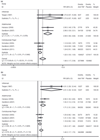Systematic review with network meta-analysis: the efficacy of anti-TNF agents for the treatment of Crohn's disease
- PMID: 24749763
- PMCID: PMC7006346
- DOI: 10.1111/apt.12749
Systematic review with network meta-analysis: the efficacy of anti-TNF agents for the treatment of Crohn's disease
Abstract
Background: Anti-tumour necrosis factor-alpha agents (anti-TNF) are effective therapies for the treatment of Crohn's disease (CD), but their comparative efficacy is unknown.
Aim: To perform a network meta-analysis comparing the efficacy of anti-TNF therapies in CD.
Methods: After screening 506 studies, reviewers extracted information on 10 studies. Traditional meta-analysis (TMA) was used to compare each anti-TNF agent to placebo. Bayesian network meta-analysis (NMA) was performed to compare the effects of anti-TNF agents to placebo. In addition, sample sizes for comparative efficacy trials were calculated.
Results: Compared to placebo, TMA revealed that anti-TNF agents result in a higher likelihood of induction of remission and response (RR: 1.66, 95% CI: 1.17-2.36 and RR: 1.43, 95% CI: 1.17-1.73, respectively) as well as maintenance of remission and response (RR: 1.78, 95% CI: 1.51-2.09 and RR: 1.68, 95% CI: 1.46-1.93, respectively). NMA found nonsignificant trends between infliximab and adalimumab or certolizumab pegol. Among subcutaneous therapies, NMA demonstrated superiority of adalimumab to certolizumab pegol for induction of remission (RR: 2.93, 95% CrI: 1.21-7.75). Sample size calculations suggest that adequately powered head-to-head comparative efficacy trials would require greater than 3000 patients.
Conclusions: All anti-TNF agents are effective for induction and maintenance of response and remission in the treatment of CD. Although adalimumab is superior to certolizumab pegol for induction of remission, there is no evidence of clinical superiority among anti-TNF agents. Head-to-head trials among the anti-TNF agents are impractical in terms of size and cost.
© 2014 John Wiley & Sons Ltd.
Figures



References
-
- Targan SR, Hanauer SB, van Deventer SJ, et al. A short-term study of chimeric monoclonal antibody cA2 to tumor necrosis factor alpha for Crohn’s disease. Crohn’s Disease cA2 Study Group. N Engl J Med 1997; 337: 1029–35. - PubMed
-
- Hanauer SB, Feagan BG, Lichtenstein GR, et al. Maintenance infliximab for Crohn’s disease: the ACCENT I randomised trial. Lancet 2002; 359: 1541–9. - PubMed
-
- Schreiber S, Rutgeerts P, Fedorak RN, et al. A randomized, placebo-controlled trial of certolizumab pegol (CDP870) for treatment of Crohn’s disease. Gastroenterology 2005; 129: 807–18. - PubMed
-
- Hanauer SB, Sandborn WJ, Rutgeerts P, et al. Human anti-tumor necrosis factor monoclonal antibody (adalimumab) in Crohn’s disease: the CLASSIC-I trial. Gastroenterology 2006; 130: 323–33. - PubMed
-
- Sandborn WJ, Feagan BG, Stoinov S, et al. Certolizumab pegol for the treatment of Crohn’s disease. N Engl J Med 2007; 357: 228–38. - PubMed
Publication types
MeSH terms
Substances
Grants and funding
LinkOut - more resources
Full Text Sources
Other Literature Sources
Medical
